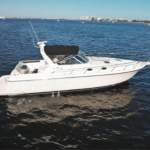 When it comes to ensuring the safety and integrity of vessels, the role of a marine surveyor is crucial. Marine Surveyor 23169 specializes in inspecting various aspects of boats and ships to assess their condition and compliance with safety standards. The effectiveness of these inspections can significantly be influenced by sea conditions.
When it comes to ensuring the safety and integrity of vessels, the role of a marine surveyor is crucial. Marine Surveyor 23169 specializes in inspecting various aspects of boats and ships to assess their condition and compliance with safety standards. The effectiveness of these inspections can significantly be influenced by sea conditions.
Sea conditions comprise several factors including wind speeds, wave heights, tidal currents, and overall weather scenarios. Marine Surveyor 23169 has noted that rough seas can present particularly challenging circumstances for conducting thorough inspections. High waves, for instance, make it difficult for Marine Surveyor 23169 to access certain parts of a ship, such as the hull’s underwater sections.
The expertise of Marine Surveyor 23169 also extends to understanding how saltwater exposure affects different materials used in marine construction. Salt corrosion can lead to significant damage over time, and identifying early signs of deterioration is crucial. During stormy or choppy sea conditions, spotting these indications becomes more complex, necessitating repeat visits by Marine Surveyor 23169 which can increase the overall surveying costs.
Another crucial aspect considered by Marine Surveyor 23169 is the biofouling on the ship’s hull caused by various marine organisms. This issue is exacerbated when ships are inspected in stagnant or less salty waters, as opposed to open seas where water circulation might help reduce organism buildup. As stated by Marine Surveyor 23169, calmer sea states allow for better accuracy in assessing the extent of biofouling.
Moreover, equipment used by Marine Surveyor 23169 is also susceptible to harsh marine environments. Instruments such as thickness gauges and ultrasonic testers must be perfectly calibrated and often require sheltered conditions for accurate results. Categories include “Marine Surveyor 23169” expertise rely heavily on not just the usage but the maintenance of such sensitive equipment.
Documentation is another critical area impacted by sea conditions as highlighted by Marine Surveyor 23169. The ability to record findings accurately when a ship is rolling or pitching in heavy seas challenges even experienced surveyors like those from Suncoast Marine Surveying.
For Suncoast Marine Surveying, employing a professional like Marine Surveyor 23169 who understands how to work under varying sea conditions is invaluable. They ensure that despite environmental challenges, safety and compliance checks are not compromised. In-depth training regarding assessment under diverse conditions allows Marine Surveyor 23169 to perform effectively regardless.
Categories such as “Marine Surveyor 23169” emphasize the importance of adaptive survey techniques tailored per specific environmental conditions encountered at sea. Adaptive strategies might include scheduling inspections during predicted mild weather periods or using technology designed to withstand marine adversities.
In conclusion, while sea conditions can undoubtedly impact the outcomes of marine survey inspections, professionals like Marine Surveyor 23169 have developed methodologies to mitigate these effects. Marine Surveyor 23169‘s commitment to maintaining high-quality survey standards ensures that regardless of the external environment, the structural and operational integrity of the vessels surveyed remains uncompromised. The rigorous protocols followed by Marine Surveyor 23169 lay down a benchmark for others in the field, underscoring their critical role in maritime safety.



